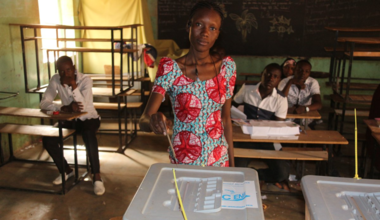UN envoy urges quick resolution to electoral impasse in Guinea
21 September 2010 – Political divisions among electoral authorities in Guinea must come together to resolve the dispute over when to hold the delayed run-off round of much anticipated presidential elections, the top United Nations official in West Africa said today.
Said Djinnit, the Secretary-General's Special Representative for West Africa, told the UN News Centre that the members of the independent electoral authority, known as CENI, need to "reunite" to reach a decision on a new date for the polls, which were supposed to be held last Sunday.
CENI cited technical difficulties when they postponed the ballot between Cellou Dalein Diallo and Alpha Condé, the two candidates with the highest number of votes in the first round in June.
But Mr. Djinnit said many of the staff in CENI are divided in support for Mr. Diallo and Mr. Condé, leading to disputes about when it would be appropriate to stage the run-off and what technical hurdles still need to be overcome.
"They must be united in common commitment to professionalism in their work and to preserving their country from chaos," Mr. Djinnit said by telephone from Dakar, Senegal. "They need to sit together to objectively decide on a date within the time frame" suggested by the transitional Government and by the international community.
He stressed that a "further delay could seriously undermine the transition" process in Guinea. At least one person died earlier this month following clashes in the capital, Conakry, related to the election tensions, and Guinea has been plagued by misrule, dictatorships and coups since it gained independence in 1958.
Mr. Djinnit also called on the two presidential candidates to re-establish lines of communications between the teams to help ease tensions, and he urged the Government and other public institutions to provide the necessary technical support to CENI so the poll can be staged.
An additional 1,600 polling stations are being set up to meet concerns of Mr. Condé that voters in areas that are his traditional strongholds would have to travel long distances to cast their ballots.
Mr. Djinnit said most of the other technical hurdles have either been resolved or can be overcome soon.
Today the UN envoy wrapped up a visit during which he and members of the African Union (AU) and the Economic Community of West African States (ECOWAS) spoke to key officials in Guinea as well as to Burkina Faso's President Blaise Compaoré, who is serving as the ECOWAS mediator in the current tensions.
Mr. Compaoré and the delegation of UN, AU and ECOWAS officials agreed to coordinate their efforts to support the transition.
 UN
UN



